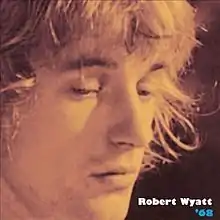'68 (album)
'68 is a compilation album by Robert Wyatt. It is composed of previously unreleased demos Wyatt recorded in 1968 at the end of a tour Soft Machine did with the Jimi Hendrix Experience in the United States.[1] It was released by Cuneiform Records in 2013.
| '68 | ||||
|---|---|---|---|---|
 | ||||
| Compilation album by | ||||
| Released | 8 October 2013 | |||
| Recorded | 1968 | |||
| Genre | Canterbury scene, jazz fusion | |||
| Length | 46:57 | |||
| Label | Cuneiform | |||
| Producer | Robert Wyatt | |||
| Robert Wyatt chronology | ||||
| ||||
After the tour, the Experience had given Wyatt access to their recording studios after hours, and he recorded these demos there. Hendrix played bass guitar on one of the recordings, "Slow Walkin' Talk". Some of the tracks were later reworked and used on several Soft Machine and Matching Mole albums.[1]
Reception
| Review scores | |
|---|---|
| Source | Rating |
| AllMusic | |
| PopMatters | |
| Rolling Stone | Favourable[3] |
| Tom Hull | B+ ( |
Writing at AllMusic, Thom Jurek said Cuneiform Records has "delivered a Holy Grail" with this album, considering that some of the recordings were believed lost, or not to have been made at all.[1] He said that the cleaning and remastering has produced an "excellent" sound, and he described the compilation as "All killer, no filler".[1]
In a review in PopMatters, Maria Schurr called '68 "especially edifying to Soft Machine die-hards", and a "great ... lost musical treasure".[2] Rolling Stone called the album "By far one of the year’s best releases".[3]
Track listing
All tracks are written by Robert Wyatt, except where noted.
| No. | Title | Length |
|---|---|---|
| 1. | "Chelsa" (Kevin Ayers, Wyatt) | 5:00 |
| 2. | "Rivmic Melodies" | 18:19 |
| 3. | "Slow Walkin' Talk" (Brian Hopper) | 3:02 |
| 4. | "Moon in June" | 20:36 |
Personnel
- Robert Wyatt – vocals, piano, electric piano, Hammond organ, bass guitar, drums, percussion
- Jimi Hendrix – bass guitar (track 3)
- Hugh Hopper – bass guitar (track 4)
- Mike Ratledge – Lowrey organ (track 4)
References
- Jurek, Thom. "'68". AllMusic. Retrieved 16 July 2014.
- Schurr, Maria (6 March 2014). "Robert Wyatt: '68". PopMatters. Retrieved 16 July 2014.
- "Robert Wyatt: '68 (Cuneiform)". Rolling Stone. Retrieved 16 July 2014.
- Hull, Tom (December 2013). "Recycled Goods (#115)". A Consumer Guide to the Trailing Edge. Tom Hull. Retrieved 20 June 2020.